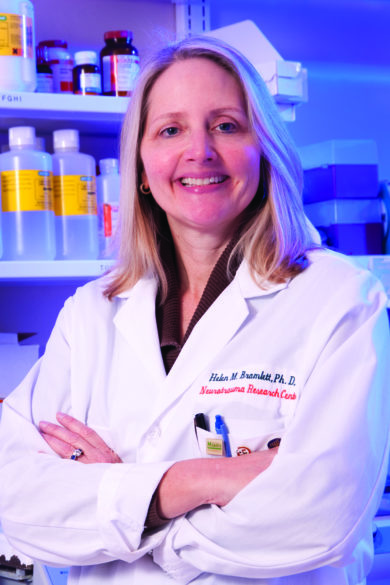In this episode of A Moment with Dalton, we talk with Jae K. Lee, Ph.D., Associate Professor, Department of Neurological Surgery and The Miami Project. Dr. Lee’s lab researches glial and fibrotic scar formation in the central nervous system, and axon regeneration. He talks with Dr. Dietrich about how natural healing in the form of…
News
Helen M. Bramlett, Ph.D., Professor of Neurological Surgery, has been named as the Editor-in-Chief of Neurotrauma Reports. This new Open Access journal is the companion publication of the Journal of Neurotrauma. The mission of Neurotrauma Reports is to support basic, translational, and clinical neurotrauma publications. “My vision for this journal is to provide the neurotrauma…
In this episode of A Moment with Dalton, we talk with Coleen Atkins, Ph.D., Associate Professor, Department of Neurological Surgery and The Miami Project. Dr. Atkins and her team focus on developing novel therapeutic interventions for traumatic brain injury (TBI). She talks with Dr. Dietrich about some potential new drugs showing promise in improving learning…
In this episode of A Moment with Dalton, we talk with Helen M. Bramlett, Ph.D., Professor, Department of Neurological Surgery and The Miami Project. Dr. Bramlett and her lab are investigating the pathophysiology of traumatic injury leading to the use of therapeutic strategies targeting specific mechanisms of damage. She discusses with Dr. Dietrich how her…
In this episode of A Moment with Dalton, we talk with a researcher who has been with The Miami Project since the beginning. Mark S. Nash, Ph.D., FACSM, is Associate Scientific Director for Research, The Miami Project, Vice-Chair for Research, Department of Physical Medicine & Rehabilitation, Professor, Departments of Neurological Surgery, Physical Medicine & Medicine and Physical…
Dear Friends of The Miami Project & The Buoniconti Fund, Our planet, as we knew it, is spinning and churning in a state of chaos created by the historic Covid-19 pandemic. With that said, our leadership team remains healthy, strong, and unwavering in our commitment to finding a cure for paralysis. Over the last thirty…
In this episode of A Moment with Dalton we talk with experienced clinician-researcher James D. Guest, M.D., Ph.D., F.A.C.S., Clinical Professor, Department of Neurological Surgery The Miami Project. Dr. Guest discusses his experience in the SCI field and insight acquired at The Miami Project as a translational researcher. His research program is focused on methods…
In this episode of A Moment with Dalton we catch up with Eva Widerström-Noga, D.D.S., Ph.D., Research Professor, Department of Neurological Surgery and Physical Medicine and Rehabilitation, Neuroscience Program and The Miami Project. Dr. Widerström-Noga discusses her chronic pain research at The Miami Project and University of Miami Miller School of Medicine. Dr. Widerström-Noga’s research…
We’re all staying safe at home, but now what? Watch one of the videos below to see a simple exercise that can help prepare your lungs to fight COVID-19. Because the virus makes it difficult to breathe, people with spinal cord injury (SCI) are at a greater risk of requiring emergency care if they contract…
In this episode of A Moment with Dalton we catch up with Daniel J. Liebl, Ph.D., Professor, Department of Neurological Surgery and The Miami Project. Dr. Liebl discusses his two decades at The Miami Project and University of Miami Miller School of Medicine where he has studied the molecular mechanisms that regulate cellular dysfunction and…



